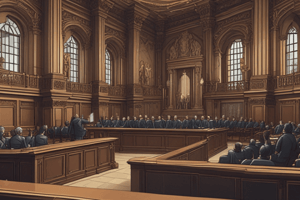Podcast
Questions and Answers
¿Qué es el control constitucional?
¿Qué es el control constitucional?
- Un proceso por el cual los ciudadanos pueden proponer nuevas enmiendas constitucionales.
- Un sistema de equilibrio de poderes dentro del gobierno de un país.
- La capacidad de un tribunal para invalidar cualquier ley que viole la Constitución. (correct)
- Un conjunto de normas que garantizan los derechos individuales de los ciudadanos.
¿Cuál es el papel principal de un tribunal constitucional?
¿Cuál es el papel principal de un tribunal constitucional?
- Promulgar nuevas leyes en un país.
- Presidir reuniones intergubernamentales.
- Redactar informes legislativos para el gobierno.
- Interpretar la constitución y proteger los derechos de los ciudadanos. (correct)
¿En qué consiste la revisión judicial?
¿En qué consiste la revisión judicial?
- Crear nuevas leyes sin aprobación del gobierno.
- Delegar el poder judicial en el legislativo.
- Permitir al presidente invalidar leyes.
- Permitir a los ciudadanos desafiar la validez de leyes y acciones ante los tribunales. (correct)
¿Qué función importante cumplen los principios constitucionales?
¿Qué función importante cumplen los principios constitucionales?
¿Por qué se considera la revisión judicial un elemento básico del Estado de Derecho?
¿Por qué se considera la revisión judicial un elemento básico del Estado de Derecho?
¿Qué característica distingue a un tribunal constitucional?
¿Qué característica distingue a un tribunal constitucional?
Flashcards are hidden until you start studying
Study Notes
Constitutional Control
Constitutional control is a system of checks and balances within a country's government to ensure that laws and actions taken by public authorities comply with the constitution. It involves several key components including judicial review, constitutional courts, and constitutional principles. These subtopics play a crucial role in maintaining balance among branches of government and protecting individual rights.
Judicial Review
Judicial review is the power of a court to declare void any law passed by the legislature or executive action taken by the president if it violates the Constitution. This process allows individuals to challenge the validity of laws and actions before courts. In some countries, such as the United States, judicial review is considered a basic element of the rule of law. Examples of how judicial review has been used effectively can be found in cases like Marbury v Madison (US) and Brown v Board of Education.
Constitutional Court
A constitutional court is a specialized body of judges whose main task is to enforce the provisions of a country's constitution. This type of court may have broad powers to strike down legislation, interpret the constitution, and protect citizens' rights. Some examples of constitutional courts include the German Federal Constitutional Court, the Czech Constitutional Court, and the Indian Supreme Court.
Constitutional Principles
Constitutional principles refer to fundamental values and concepts enshrined in a nation's constitution. They serve as the foundation for the legal order in a country and provide a framework for decision-making by public authorities. Some common constitutional principles include the rule of law, separation of powers, and protection of individual rights.
In conclusion, constitutional control is an essential mechanism for maintaining the balance of power among government branches and protecting individual rights. Through judicial review, constitutional courts, and constitutional principles, governments and their actions can be held accountable to the rule of law.
Studying That Suits You
Use AI to generate personalized quizzes and flashcards to suit your learning preferences.





